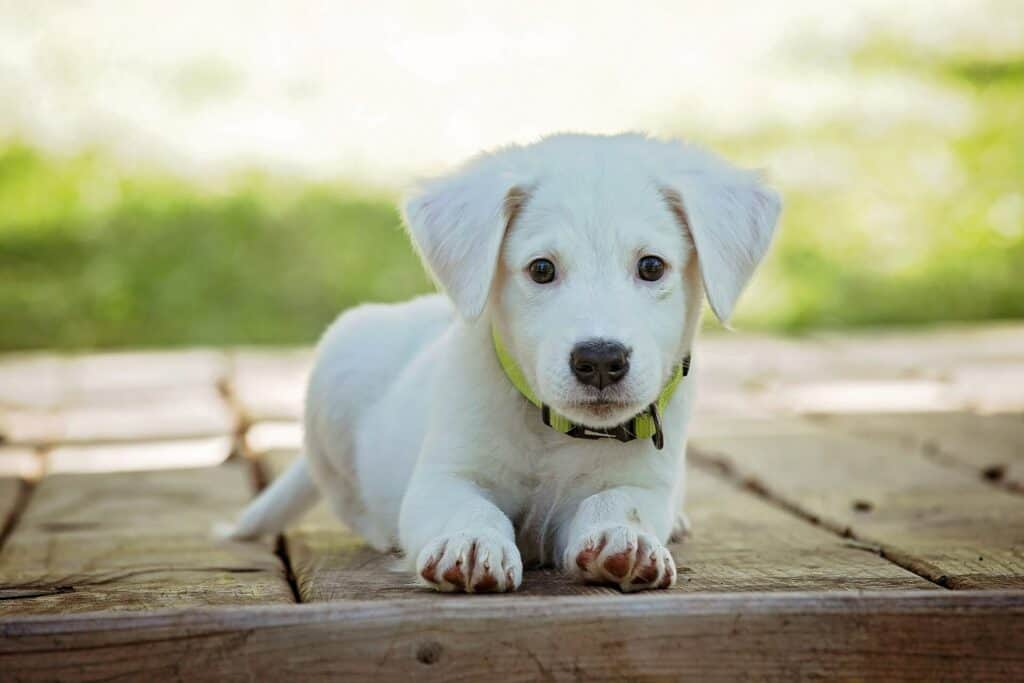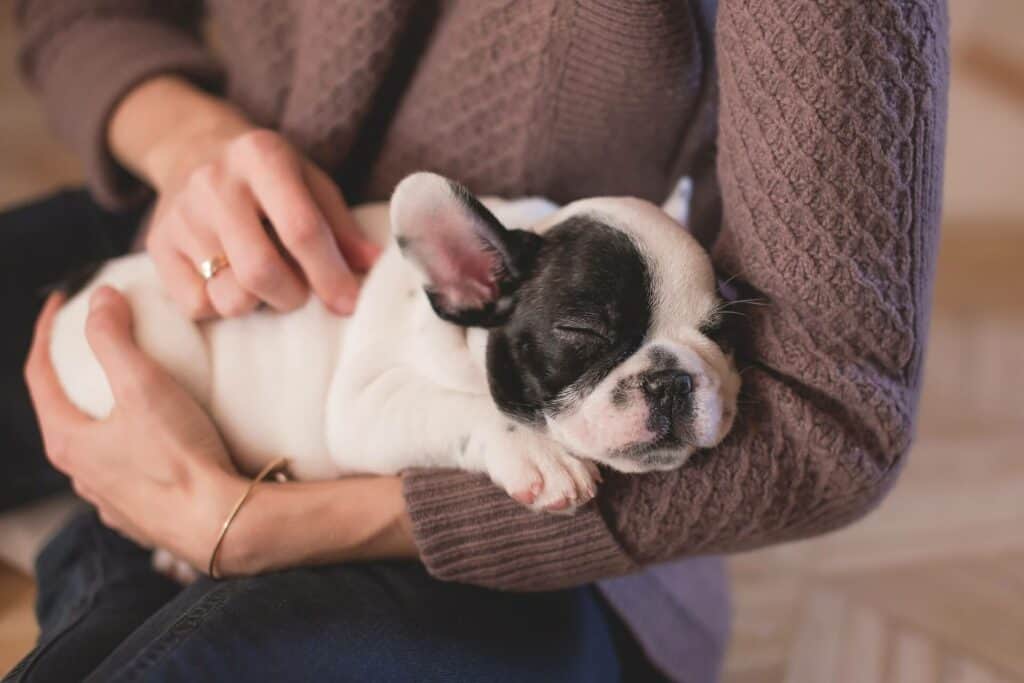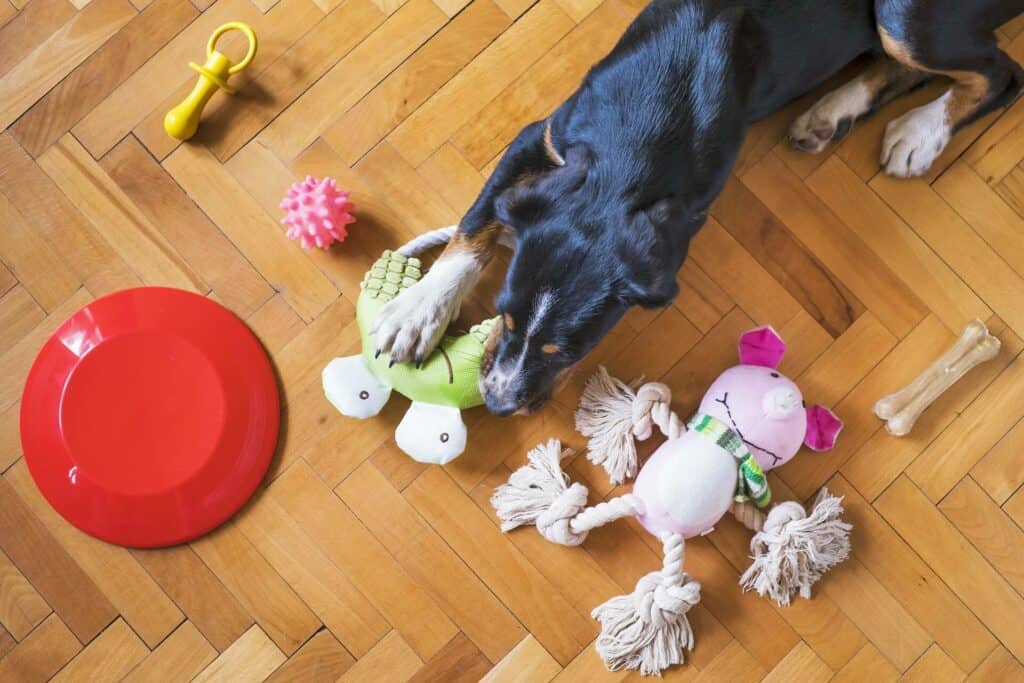Your growing 5–6 week-old puppy needs a healthy balance of diet, sleep, and play. For starters, a puppy's 5–6 week-old growth period is when their bodies significantly develop.
This stage is when they're weaning from their mothers and learning to explore the world around them. That's why it's crucial to know how to care for 5 to 6-week-old puppy.

What 5–6 Week–Old Puppy Needs
Make sure to cover all of these necessities for your puppy's growth period:
- Diet
- Sleep
- Training
- Socialization
- Vaccination
How Do I Feed My Puppy?
Your 5-week-old pupper, while still drinking its mom's milk, is also learning to eat its mom's food.
By this time, 80% of its diet should be puppy food. Unfortunately, the mom's milk is no longer enough to give the puppy the necessary nutrients.
Then, at week 6, your pup should be fully weaned from its mom and primarily eat puppy food.
What Do I Feed My Puppy?
Puppy food that supports their overall growth is best for their diet. For easy chewing, wet food is ideal for your pup.
Though sometimes, wet food can be pricey, especially canned food. Instead, you can buy dry kibble and moisten it with plain water or broth until it’s soft enough to eat.
Opt for high-quality puppy food with complete nutrients for your young furry friend.
How Much Should I Feed Them?
Puppies are active and energetic at this stage, requiring higher calorie intake than adult dogs.
It’s best to consult with your veterinarian first on how much your pup should eat.
You can also refer to Feeding Charts from dog food brands on how much to feed your puppy. These charts show how to measure meals according to your pup’s weight, whether large or small breeds.
Usually, measured meals of about half a cup to one cup are enough for your pup.
How Often Should I Feed Them?
Puppies younger than eight weeks need to eat three times daily to meet their nutritional requirements.
Create a feeding schedule and be consistent daily so you don’t miss your pup’s meals. Your young canine’s last meal should be at 5 PM so they can eliminate before bedtime.
What Foods Should My Puppy Avoid?
Generally, all dogs should avoid these foods that are toxic to them:
- Chocolate
- Grapes and raisins
- Avocado
- Cooked bones
- Onion (all kinds) and garlic
- Artificially sweetened sweets
- Spicy Food
- Corn
- Macadamia nuts
Where Should My Puppy Sleep?
Training young dogs to sleep in crates is a great way to teach them to sleep in one place.

Provide them with a crate that has enough space to fit their size. Also, add a cushion to protect their fragile bones from the crate’s hard surface.
How Do I Help My Puppy Sleep?
Playing with your puppy in the crate before sleeping will make them feel less lonely.
At times, you have to monitor them at night in case they wake up for potty breaks.
Keeping their crates nearby will be easier for you to watch over them.
How Do I Train My Puppy?
Train your puppy with extra care and patience; this developing stage is where they learn to bond with you.
Don’t worry if your young furry friend won’t get it right the first time.
Always use positive reinforcement to help your pupper see this as an essential playtime with you.
Command Training
It’s beneficial for them to learn basic doggy manners this young.
Puppies at this age can understand when you call their name or command them “Sit” or “Down.” With their short attention span, keep your training for only a few minutes but simultaneously engaging.
Potty Training
If your puppy stays indoors often, take them to their designated potty spot every one to two hours. Following a schedule will help them get into that routine until they’re responsible enough to eliminate on their own.
Crate training is another way you can potty train them. Make sure to give them a separate potty crate from their sleeping crate.
If your young canine makes an accident indoors, pick them up to where they’re supposed to eliminate.
Encourage them with a treat once they recognize where to go. Be patient and don’t yell at them, as this will become a negative experience for your pup.
Chew Toy for Teething

At weeks five to six, your puppy’s baby teeth, a total of 28, should’ve come in by then.
This is the time your pup begins to start chewing on objects. Introduce safe and vet-recommended-chew toys for them to play with.
Supervise your young dog as well because they might make the mistake of swallowing or choking on their toys.
Biting Inhibition
Puppies don’t know how hard they bite until their playmates start yapping in pain. When they bite their mom, she may snarl at her puppies to teach them to behave.
When your puppy starts biting you, you can also let them know it hurts by yelping. Although, there’s a calmer way to teach them how to stop, as exclaiming may spur them on.
Hide your hands under your pits, turn your back, and slowly walk away until they learn how to control themselves.
Once they recognize that they’re misbehaving, reward them with a treat for being a good puppy.
You may also gently return them to their sleeping crate until they calm down. It teaches them to realize that playtime is over when they start to bite hard.
Socialization
This is the right time for your pups to socialize with their human companion and other dogs. It’s also important to gently handle these puppers as you interact with them.
Expose them to new surroundings as they take in the world around them.
Your pup’s siblings are also playmates, so make sure to give them a good space to run around. Let them meet other friendly pets as well.
In this exploration period, your puppies also have a high fear threshold, especially with loud noises. You can train them to get used to these sounds, like playing videos with loud construction noises.
What Kinds of Vaccination Do 5–6 Week-Old Puppies Need?
By week six, your puppies should receive vaccination against Distemper and Parvovirus. Vaccination against Bordetella is also ideal.

Paul has been creating content for the dog niche for many years. The information he shares comes his first hand experience growing up in dog lovers household and then owning multiple dog breeds of his own as an adult. Paul enjoys doing the hard research to collect, analyze and present our dogtemperament.com readers with the best answers to their questions.